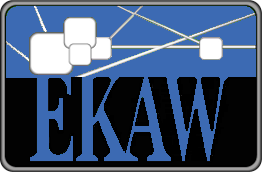 We are very pleased to announce that our group got 2 papers accepted for presentation at The 21st International Conference on Knowledge Engineering and Knowledge Management (EKAW 2018) conference, which will be held on 12 – 16 November 2018 in Nancy, France.
We are very pleased to announce that our group got 2 papers accepted for presentation at The 21st International Conference on Knowledge Engineering and Knowledge Management (EKAW 2018) conference, which will be held on 12 – 16 November 2018 in Nancy, France.
The 21st International Conference on Knowledge Engineering and Knowledge Management is in concern with all aspects about eliciting, acquiring, modeling and managing knowledge, and the construction of knowledge-intensive systems and services for the semantic web, knowledge management, e-business, natural language processing, intelligent information integration, and so on. The special theme of EKAW 2018 is “Knowledge and AI”. We are indeed calling for papers that describe algorithms, tools, methodologies, and applications that exploit the interplay between knowledge and Artificial Intelligence techniques, with a special emphasis on knowledge discovery. Accordingly, EKAW 2018 will put a special emphasis on the importance of Knowledge Engineering and Knowledge Management with the help of AI as well as for AI.
Here is the list of accepted papers with their abstracts:
- “Divided we stand out! Forging Cohorts fOr Numeric Outlier Detection in large scale knowledge graphs (CONOD)” by Hajira Jabeen, Rajjat Dadwal, Gezim Sejdiu, and Jens Lehmann.
Abstract : With the recent advances in data integration and the concept of data lakes, massive pools of heterogeneous data are being curated as Knowledge Graphs (KGs). In addition to data collection, it is of utmost importance to gain meaningful insights from this composite data. However, given the graph-like representation, the multimodal nature, and large size of data, most of the traditional analytic approaches are no longer directly applicable. The traditional approaches could collect all values of a particular attribute, e.g. height, and try to perform anomaly detection for this attribute. However, it is conceptually inaccurate to compare one attribute representing different entities, e.g.~the height of buildings against the height of animals. Therefore, there is a strong need to develop fundamentally new approaches for the outlier detection in KGs. In this paper, we present a scalable approach, dubbed CONOD, that can deal with multimodal data and performs adaptive outlier detection against the cohorts of classes they represent, where a cohort is a set of classes that are similar based on a set of selected properties. We have tested the scalability of CONOD on KGs of different sizes, assessed the outliers using different inspection methods and achieved promising results.
Abstract : Although the use of apps and online services comes with accompanying privacy policies, a majority of end-users ignore them due to their length, complexity and unappealing presentation. In light of the, now enforced EU-wide, General Data Protection Regulation (GDPR) we present an automatic technique for mapping privacy policies excerpts to relevant GDPR articles so as to support average users in understanding their usage risks and rights as a data subject. KnIGHT (Know your rIGHTs), is a tool that finds candidate sentences in a privacy policy that are potentially related to specific articles in the GDPR. The approach employs semantic text matching in order to find the most appropriate GDPR paragraph, and to the best of our knowledge is one of the first automatic attempts of its kind applied to a company’s policy. Our evaluation shows that on average between 70-90% of the tool’s automatic mappings are at least partially correct, meaning that the tool can be used to significantly guide human comprehension. Following this result, in the future we will utilize domain-specific vocabularies to perform a deeper semantic analysis and improve the results further.
Acknowledgment
This work was partly supported by the EU Horizon2020 projects WDAqua (GA no.~642795), Boost4.0 (GA no.~780732) and BigDataOcean (GA no.~732310) and DAAD.
Looking forward to seeing you at The EKAW 2018.

